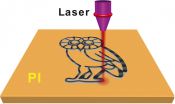Anyone who is good at German learns English better
2014-12-10
(Press-News.org) "A tree must be bent while it is young," as one saying about learning a foreign language goes. In other words, the earlier you start learning a foreign language systematically, the better the language level will be in the long run. The second widely held view is that you need to be solid in your first language (L1) in order to develop good literacy skills in the foreign language. Linguist Simone Pfenninger from the University of Zurich has been examining these two myths in her five-year study involving Swiss high-school children in order to identify the optimal starting age for learning German as a language of literacy and English as a foreign language. The partial results she has just published reveal that anyone who reads and writes German well is likely to carry over this advantage to English - and, interestingly, regardless of the age of onset of foreign language learning or the biological age. The study also shows that students who are given early exposure to English do not maintain a clear advantage for more than a relatively short period over students who begin to learn the language only at secondary level. In fact, early foreign language learning can even have a negative impact on the L1 in the short run.
Positive and negative influences of German on English researched
For five years, the UZH scientist has been studying the extent to which starting age, biological age and L1 skills - Swiss or High German - influence the development of English proficiency. In order to test their skills in German and English, the literacy skills of 200 randomly selected high-school children in the Canton of Zurich were tested at the beginning and towards the end of their obligatory schooling in the senior grades. One group had begun English lessons in primary school at the age of eight, while the second group had only started English in high school at the age of thirteen.
Besides the positive influence of German on English, the negative influences and transfer of structures from the L1 to the foreign language were also studied in the areas of syntax and morphology. "After all, as the mother tongue becomes increasingly entrenched, you might also expect an increasing negative influence of the L1 on English," explains Pfenninger.
As the results showed, foreign language lessons at an early age did not have a beneficial impact either in the long or in the short term. Already after six months learners who had started five years later had caught up with the early learners and sometimes even surpassed them, e.g. in terms of morpho-syntactic accuracy and complexity, syntactic fluency, grammaticality judgment, and content-related and structural aspects of written expression. However, the early learners had a larger vocabulary at the first measurement and less of a tendency to fill the gaps in their vocabulary in the foreign language with so-called "code-switching" into German. "By the second assessment, shortly before the final high-school exams, there were no longer any differences between early and late starters," says Pfenninger.
Late starters had better German writing skills
According to the study's author, the slightly disappointing results for early foreign language learning can be attributed to the following reasons (among others): at the beginning of high school, the late learners exhibited significantly better German writing skills than the early learners, who had already been taught German, English and French in elementary school. The late learners therefore began foreign language lessons with a more favorable foundation in the language of literacy. By the second assessment five years later, however, this advantage had disappeared.
Moreover, the link between German and English writing skills also displayed a positive and significant correlation: "Anyone who is good at German can carry over this advantage to the foreign language, utterly regardless of the age when they start learning the foreign language or their biological age," sums up Pfenninger. Therefore, the results of this study have shown so far that, where success is concerned, this does not relate for the most part to age of onset or length of the exposure to the foreign language
INFORMATION:
Literature:
Pfenninger, Simone E. The Literacy Factor in the Optimal Age Debate: a 5-Year Longitudinal Study. International Journal of Bilingual Education and Bilingualism. December 10, 2014. doi: 10.1080/13670050.2014.972334
Contacts:
Dr. Simone E. Pfenninger
English Department
University of Zurich
Tel.: +41 44 634 35 25 / + 41 79 832 51 49
Email: simone.pfenninger@es.uzh.ch
ELSE PRESS RELEASES FROM THIS DATE:
2014-12-10
Reston, Va. (December 9, 2014) - Cancer therapy can be much more effective using a new way to customize nuclear medicine treatment, researchers say in the December 2014 issue of The Journal of Nuclear Medicine. The process could also be useful for other diseases that could benefit from targeted radiation.
Targeted therapy with radiopharmaceuticals--radioactive compounds used in nuclear medicine for diagnosis or treatment--has great potential for the treatment of cancer, especially for cancer cells that have migrated from primary tumors to lymph nodes and secondary organs ...
2014-12-10
London, United Kingdom, December 9, 2014 - As the Ebola Virus Diseases (EVD) epidemic continues to rage in West Africa, infectious diseases experts call attention to the striking lack of treatment guidelines. With over 16,000 total cases and more than 500 new infections reported per week, and probable underreporting of both cases and fatalities, the medical community still does not have specific approved treatment in place for Ebola, according to an editorial published in the International Journal of Infectious Diseases.
Not only are treatment guidelines lacking, but ...
2014-12-10
Studying the social interaction of bears through the use of camera traps and visual observations requires that humans be able to tell individuals apart. A study done using volunteers to study the vulnerable Andean bear indicates that people can learn to identify individual bears, given a little practice. The research, done by San Diego Zoo conservationists with international collaborators using photos spanning many years, also indicates that young bears usually retain many of their unique markings as they grow older.
"Knowing, scientifically, that people who have been ...
2014-12-10
Researchers from Johannes Gutenberg University Mainz (JGU) and the Julius Maximilian University of Würzburg are proposing potential new active substances for treating the dengue virus. Just like Ebola, dengue fever is also caused by a virus for which there is currently no cure and no vaccine and can be fatal.
In the quest for medication to treat the dengue virus, the scientific community is focusing on a particular enzyme of the pathogen, the protease known as NS2B/NS3. The reason for this is that inhibitors of similar proteases have been revealed to be very effective ...
2014-12-10
JACKSONVILLE, Fla. -- A marker of immune function that predicts for better outcomes in patients treated with chemotherapy for triple negative breast cancer is also linked to improved prognosis in patients treated with chemotherapy for HER2-positive breast cancer. But that marker -- the quantity of tumor-infiltrating lymphocytes (S-TILs) in a biopsy -- appears irrelevant when trastuzumab is used.
And since trastuzumab, and not chemotherapy alone, is the standard of care for the HER2-positive sub-class of breast cancer, there is no need to test for these lymphocytes in ...
2014-12-10
In patients with metastatic triple-negative breast cancer--a disease with no approved targeted therapies--infusion of pembrolizumab produced durable responses in almost one out of five patients enrolled in a phase-Ib clinical trial, according to data presented Dec. 10, at the 2014 San Antonio Breast Cancer Symposium.
The multi-center, non-randomized trial was designed to evaluate the safety, tolerability and antitumor activity of bi-weekly infusions of pembrolizumab (MK-3475, marketed as Keytruda®). The researchers enrolled 27 patients, aged 29 to 72 years, who had ...
2014-12-10
Several past studies have suggested that the magnetic fields created by phones, high-voltage power lines and other electrical equipment are harmful for humans.
Research first carried out in the 1970's and again subsequently, found an association between people living near overhead power lines and an increased risk of childhood leukaemia. Although some later studies have failed to find such a link, the International Agency for Research on Cancer has categorised low frequency magnetic fields as "possibly carcinogenic."
But a mechanism for this association has never been ...
2014-12-10
While many different combinations of genetic traits can cause autism, brains affected by autism share a pattern of ramped-up immune responses, an analysis of data from autopsied human brains reveals. The study, a collaborative effort between Johns Hopkins and the University of Alabama at Birmingham, included data from 72 autism and control brains. It will be published online Dec. 10 in the journal Nature Communications.
"There are many different ways of getting autism, but we found that they all have the same downstream effect," says Dan Arking, Ph.D. , an associate professor ...
2014-12-10
HOUSTON - (Dec. 10, 2014) - Researchers at Rice University have created flexible, patterned sheets of multilayer graphene from a cheap polymer by burning it with a computer-controlled laser. The process works in air at room temperature and eliminates the need for hot furnaces and controlled environments, and it makes graphene that may be suitable for electronics or energy storage.
Under a microscope, what the researchers call laser-induced graphene (LIG) doesn't look like a perfect chicken wire-like grid of atoms. Instead, it's a jumble of interconnected graphene flakes ...
2014-12-10
Phoenix, AZ (December 10th, 2014) - The brain responds differently to two kinds of sugar, according to a report today at the American College of Neuropsychopharmacology annual meeting in Phoenix Arizona. The study suggests that fructose heightens the response of brain reward circuits to food cues, promoting feeding behavior.
Currently, roughly two out of three U.S. adults are overweight and one out of three is obese. Changes in lifestyle and dietary intake during the past quarter century are thought to be the main culprits, with the increase in fructose consumption of ...
LAST 30 PRESS RELEASES:
[Press-News.org] Anyone who is good at German learns English better

